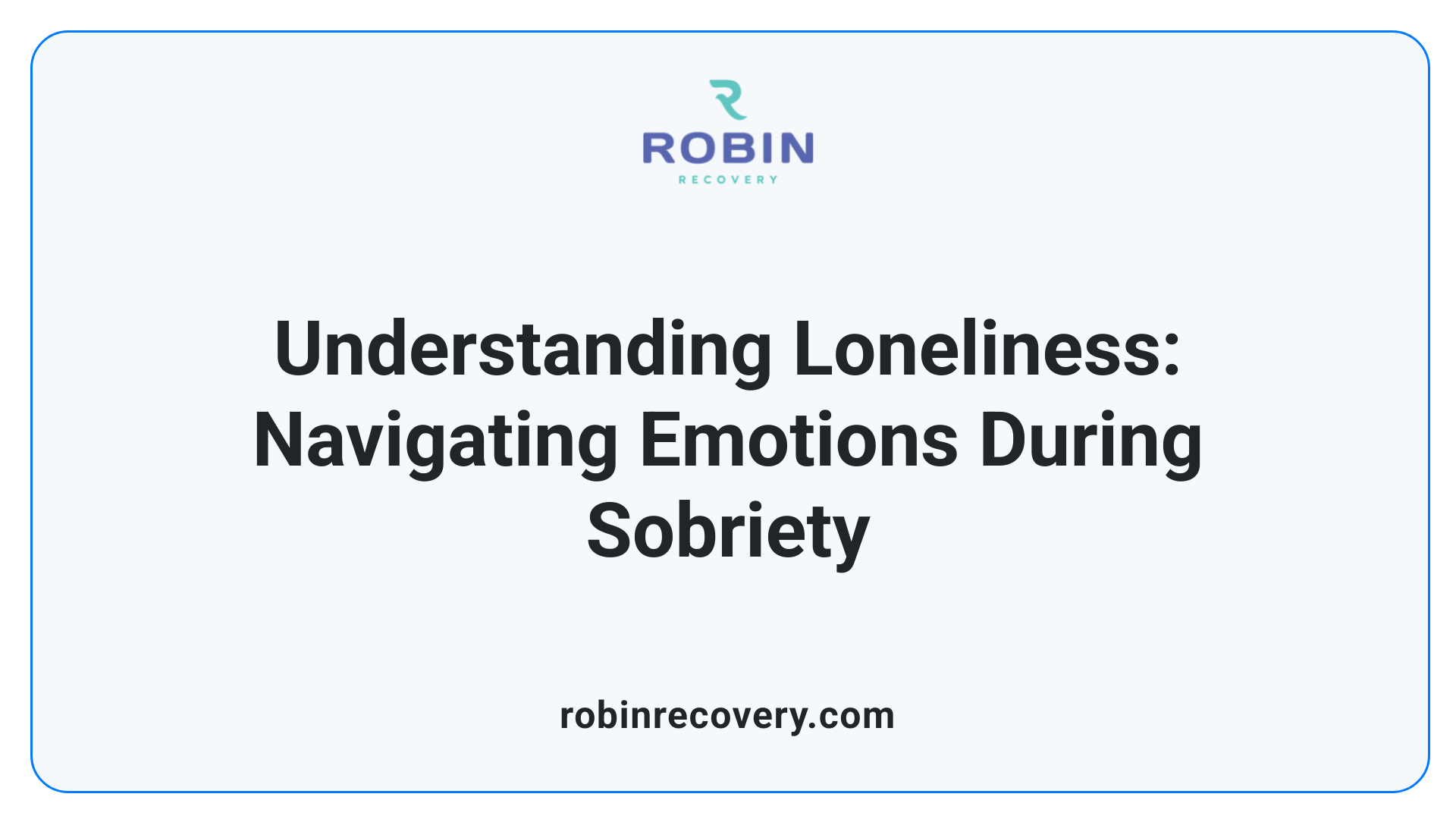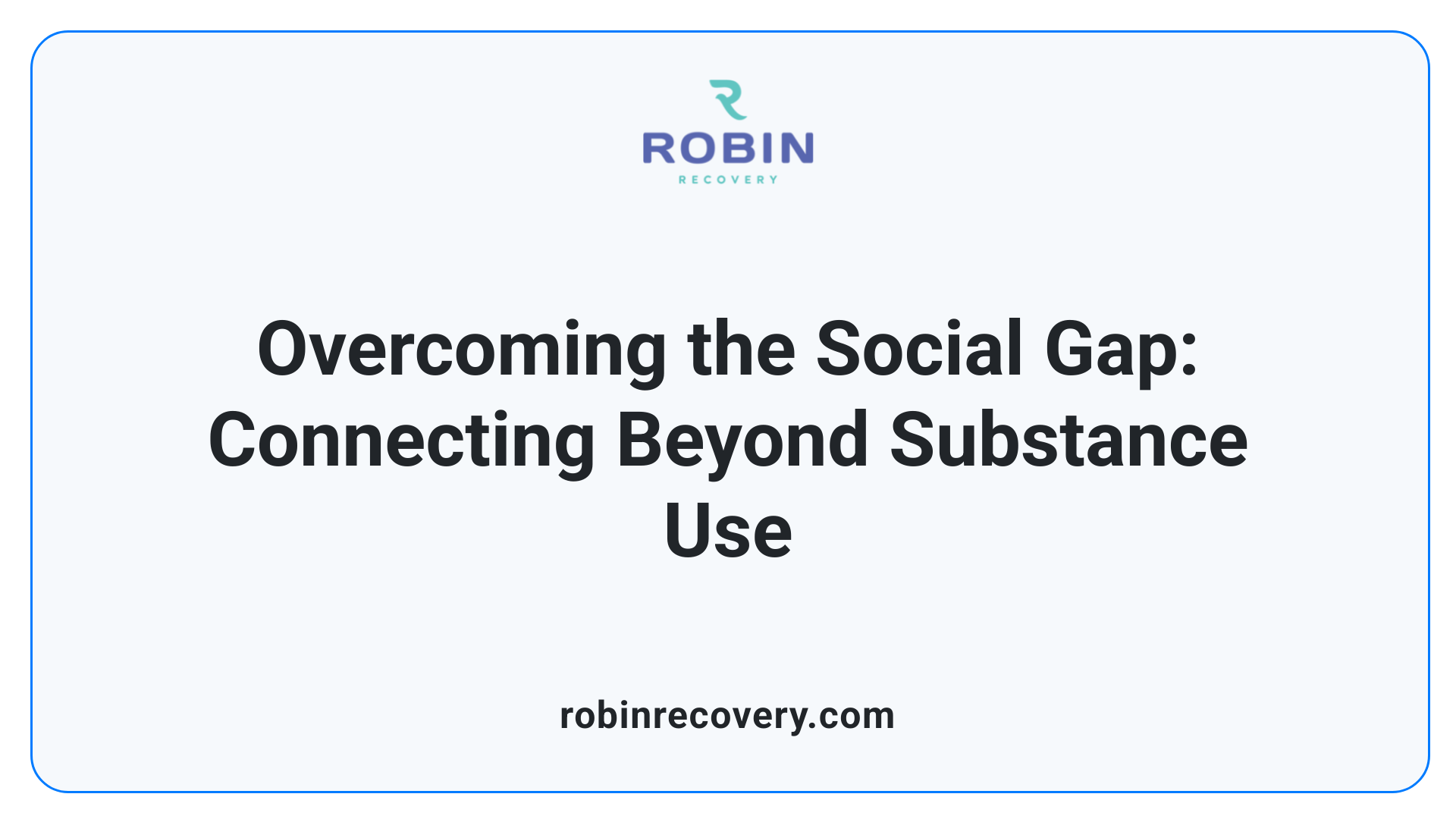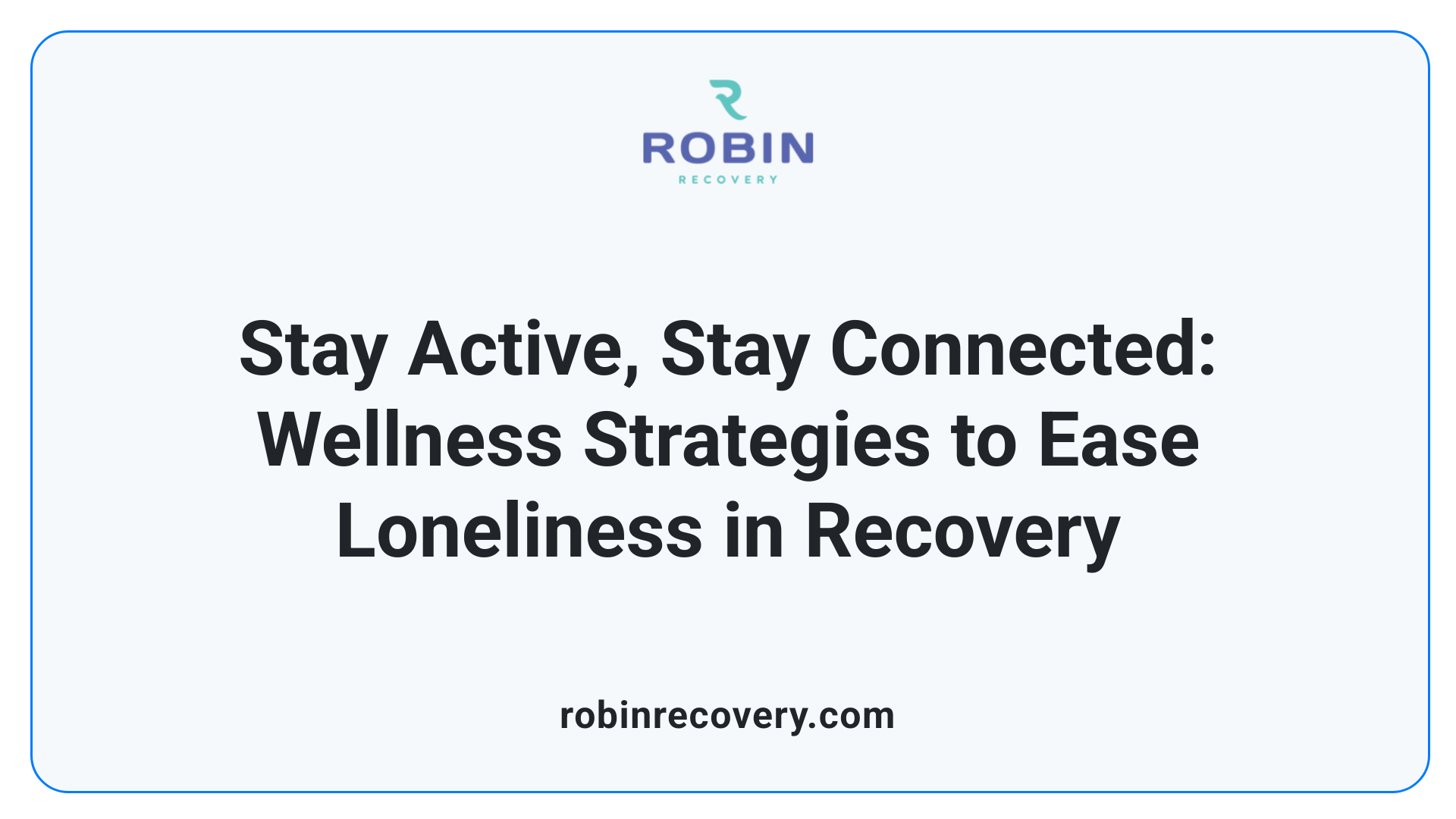How to deal with feelings of loneliness during recovery

Understanding Loneliness in Recovery
Embarking on sobriety is a commendable decision that significantly improves health and well-being. However, a common challenge faced during this journey is feelings of loneliness, which can be overwhelming and may threaten progress. Recognizing the emotional impact of loneliness, its effects on recovery, and effective coping strategies is crucial for sustaining sobriety and fostering emotional resilience.
The Emotional Landscape of Loneliness in Recovery

Why does sobriety sometimes feel lonely?
Sobriety can often bring about feelings of loneliness because social environments frequently revolve around alcohol or substance use. When someone stops drinking, they might find it difficult to connect with friends or family who still partake in these habits. This can lead to a sense of exclusion, making social interactions feel less natural or fulfilling.
Quitting alcohol or drugs also means withdrawing from social circles that were built around substance use, which can be emotionally taxing. The feelings of withdrawal from such circles sometimes create a gap where support and familiarity used to exist.
Moreover, the emotional effects of previous substance use—such as depression and anxiety—may intensify during early recovery, heightening feelings of isolation. When individuals abstain, they may also face the cycle of using substances to escape feelings of loneliness, which then deepens the sense of disconnection.
To address this loneliness, it helps to participate in alcohol-free activities, build new social networks through support groups or community events, and seek guidance from mental health professionals. These steps can foster a sense of belonging and lessen feelings of being alone.
How can I cope with loneliness during recovery?
Coping strategies involve active engagement and self-care. It’s beneficial to balance staying busy with moments of reflection. Participating in outdoor activities like hikes or visits to parks, exploring creative hobbies such as painting or music, and learning new skills can provide purpose and satisfaction.
Volunteering or joining group activities offers opportunities to meet others who share similar recovery journeys. These social interactions can nurture support and reduce feelings of isolation.
Reconnecting with friends and family can re-establish emotional bonds. Additionally, adopting pets or volunteering with animals can provide unconditional companionship and emotional comfort.
Practicing mindfulness and digital detoxning — like turning off devices during certain times — encourages emotional regulation and promotes well-being. Celebrating small wins and embracing solitude as a time to recharge can make the recovery process more positive and less lonely.
How can therapy help address loneliness during recovery?
Therapy plays an essential role by helping individuals understand and manage feelings of loneliness. Cognitive Behavioral Therapy (CBT), for example, is effective as it targets unhelpful thought patterns that contribute to social withdrawal.
CBT assists individuals in developing behavioral activation strategies, improving social skills, and overcoming anxieties related to social situations. This makes it easier to form and sustain meaningful relationships.
Therapists can tailor interventions for specific needs, such as helping socially anxious individuals or older adults facing social disconnection. Incorporating technology in therapy—through online sessions or support groups—also enhances accessibility, particularly for those unable to attend in person.
Overall, therapy provides practical tools and emotional support that empower individuals to counteract loneliness, bolster mental health, and sustain sobriety during recovery.
BuildingConnections: Rebuilding and Creating Social Support Networks

Why does sobriety sometimes feel lonely?
Embarking on the path to sobriety can be accompanied by feelings of loneliness, which are quite common among individuals in recovery. One reason for this is that social settings often revolve around alcohol or substances; without these, social interactions can feel awkward or less enjoyable. Many people have built social ties through drinking or drug use, and leaving these environments can mean losing some of that connection.
Additionally, quitting substances can lead to withdrawal not only physically but emotionally, heightening feelings of isolation. The cycle of using alcohol or drugs as a way of coping with loneliness often reinforces these feelings. As individuals abstain, they might find it more difficult to relate to friends or peers still engaged in substance use.
The emotional aftermath of substance use, such as depression or anxiety, may also contribute to loneliness in recovery. Despite these challenges, actively engaging in alcohol-free activities, seeking support from friends, family, or professionals, and developing new social networks are effective ways to foster a sense of belonging and reduce feelings of isolation.
How can I cope with loneliness during recovery?
Coping with loneliness during recovery requires a balanced approach that includes staying active and allowing time for personal reflection. Engaging in outdoor activities like hikes or walks can improve mood and provide opportunities for mindfulness.
Creative hobbies such as painting, cooking, or playing music can serve as outlets for emotion and ways to spend time meaningfully.
Volunteering is another excellent strategy, enabling individuals to connect with others who share a desire to help, which fosters community and self-worth.
Reconnecting with family and friends, when possible, helps rebuild emotional bonds. Adopting pets or volunteering with animals can also provide companionship and unconditional love.
Moreover, it's beneficial to incorporate moments of solitude—using mindfulness or meditation—to increase emotional resilience. Limiting digital distractions, like social media or online gaming, can also foster well-being and reduce feelings of loneliness.
How can therapy help address loneliness during recovery?
Therapy plays a vital role in combating loneliness by addressing negative thought patterns and promoting healthier social behaviors. Cognitive Behavioral Therapy (CBT) is especially effective, as it helps individuals identify unhelpful beliefs about themselves and others, develop skills for social interaction, and build confidence.
Therapy can also assist in setting realistic goals for social engagement, addressing social anxiety, and developing emotional regulation strategies.
For those who find in-person therapy challenging, online platforms increase accessibility, allowing ongoing support and guidance that reduce feelings of isolation.
Additionally, group therapy sessions and support groups provide communal spaces where individuals can share experiences, gain empathy, and build camaraderie. Overall, therapy offers practical tools and emotional understanding crucial for feeling connected and supported in recovery.
How can rebuilding relationships with family and friends help in recovery?
Rebuilding relationships with loved ones is foundational in recovering from substance use disorder. These connections provide emotional support, validation, and a sense of belonging essential for mental health.
Approaching past conflicts with honesty and making amends can restore trust and deepen bonds. Small actions such as regular communication, sharing milestones, and expressing gratitude help strengthen these relationships.
Gradually reconnecting allows individuals to rebuild a support system that’s vital during setbacks or stressful times. Family and friends can also serve as accountability partners, cheering on progress and providing comfort.
What is the role of support groups like AA, NA, and SMART Recovery?
Support groups such as Alcoholics Anonymous (AA), Narcotics Anonymous (NA), and SMART Recovery serve as vital communities for individuals in recovery. They offer shared understanding, encouragement, and practical advice from peers who face similar challenges.
Participating in these groups fosters a sense of belonging, reduces feelings of loneliness, and promotes accountability.
Many find that these meetings offer not only emotional support but also friendship and camaraderie, which bolster resilience against relapse.
How does engaging in community activities and volunteering help?
Active participation in community activities or volunteering provides purpose, structure, and opportunities for social interaction outside of substance-related environments. Helping others through volunteer work fosters a sense of achievement and belonging.
Such involvement can lead to new friendships, improve self-esteem, and reinforce a sober lifestyle. Sober events, clubs, classes, and local groups can serve as enjoyable, substance-free outlets where individuals connect with like-minded people.
How can technology facilitate maintaining connections remotely?
In today’s digital age, technology offers numerous avenues to stay connected, especially when in-person meetings aren’t possible. Virtual support groups, online forums, and social media communities dedicated to recovery provide ongoing emotional support.
Video calls, messaging apps, and online events help individuals maintain relationships with friends, family, and peers regardless of geographic barriers. Utilizing these tools can prevent feelings of isolation, promote continuous social engagement, and foster a sense of community during recovery.
Strategies for Building Social Connections Activities Benefits Additional Tips Rebuild relationships with loved ones Family visits, small reconnections Emotional support, trust Be patient, start small Make amends Apologize, rebuild trust Closure, emotional healing Take responsibility for past, be sincere Support groups participation AA, NA, SMART Recovery Peer understanding, friendship Attend regularly, participate actively Community involvement Volunteering, clubs, sober events Purpose, social skills Find activities aligned with interests Utilize technology Online meetings, support forums Continuity in connection Limit social media for mental health
Developing new or restoring existing social support networks requires patience, effort, and self-compassion. These connections are instrumental in making the recovery journey less lonely, strengthening resilience, and maintaining long-term sobriety.
The Power of Activity: Hobbies, Volunteering, and Wellness in Combating Loneliness

Why does sobriety sometimes feel lonely?
Embarking on sobriety can bring about feelings of loneliness due to the social dynamics that often surround alcohol and other substances. Many social events and gatherings involve drinking, which can make individuals who choose sobriety feel excluded or out of sync with their peers. As they withdraw from environments where substance use was prevalent, they may experience a sense of loss and isolation.
Moreover, quitting alcohol or drugs often results in withdrawal from social circles that were built around substance use. The emotional effects of alcohol, such as feelings of depression or anxiety, can also deepen loneliness when abstaining. This cycle—using substances to cope with loneliness and then feeling lonely after quitting—can intensify the sensation of disconnection.
To counter these feelings, new sober activities and supportive social networks are essential. Joining support groups, engaging in hobbies, and participating in alcohol-free community events help create a sense of belonging. Building new connections and seeking support from mental health professionals can foster emotional resilience and diminish loneliness during recovery.
Fostering Hope and Connection
While the journey of recovery can be marked by feelings of loneliness and emotional challenges, it also offers an opportunity for personal growth, self-discovery, and building new social bonds. Recognizing that loneliness is a common experience, utilizing available resources like therapy, support groups, hobbies, and community involvement can help forge meaningful connections. Patience, self-compassion, and intentional efforts to reconnect with oneself and others are essential for overcoming isolation and creating a fulfilling sober life. Remember, rebuilding a supportive network and engaging in activities that bring joy and purpose are powerful steps toward lasting recovery and emotional well-being.
References
- Coping with Loneliness in Early Recovery - The Berman Center
- 5 Ways to Combat Loneliness in Your Addiction Recovery
- 5 Ways To Overcome Loneliness In Addiction Recovery
- Loneliness in Recovery: Overcoming Isolation & Finding Support
- How to Manage Loneliness During Recovery
- Ten Ways to Combat Loneliness in Recovery
- How to Deal with Loneliness in Recovery - The Right Step Houston
